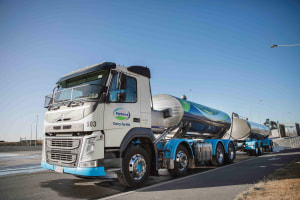Amcor has released its FY23 Sustainability Report, titled The Future of Packaging is Here, which details how Amcor is delivering on the ambitious, industry-leading sustainability commitments it has made during the past decade.
Amcor says the FY23 Sustainability Report provides tangible evidence of that progress across multiple dimensions, including carbon footprint reduction, innovative product design, and recycled content use.
“Amcor recognised years ago that our commitment to shaping the future of packaging required rethinking our present and taking meaningful action,” said Ron Delia, CEO of Amcor.
“We are integrating sustainability and innovation into our business and it goes beyond just imagining more sustainable packaging solutions – we are bringing them to life.”
Every year, Amcor invests approximately US$100 million in R&D to bring to market innovative solutions that help customers meet their sustainability goals.
At the end of FY23, Amcor’s global portfolio of products designed to be recycled, reusable or compostable reached 90 per cent, with a goal of 100 per cent by 2025.
By segment, 89 per cent of Amcor’s flexible packaging portfolio has a recycle-ready design solution available, and 95 per cent of rigid packaging by weight is recyclable in practice. Compared to the prior year, the company also increased the amount of recycled material it purchased for its products by almost 30 per cent.
Amcor made strides in broadening the availability of paper-based packaging that is recyclable in most waste streams.
Over 92 per cent of purchased fibres were certified to an external sourcing standard (up from 75 per cent in FY22), and the company launched its AmFiber Performance Paper in Asia, Latin America and North America, while expanding its offering in Europe.
Additionally, 100 per cent of packaging produced by Amcor Specialty Cartons is certified as recyclable by Institute cyclos-HTP.
In addition, Amcor continues to expand its partnerships across the value chain. Along with Mondelez International, Amcor announced an investment in advanced recycling technology pioneer Licella to construct one of the first advanced recycling facilities in Australia.
Amcor also entered into a multi-year deal to secure access to high-performance certified-circular material from ExxonMobil globally.
“Sustainability is the driving force in how we approach packaging and think about the future,” said David Clark, vice-president of Sustainability at Amcor.
“Amcor’s commitment to a more sustainable future is made possible through our talented teams, our investors in product development, and the strategic partnerships with our value chain partners, investors and customers. Together, we are getting closer to a circular economy.”
Within its manufacturing operations, Amcor achieved a 10 per cent reduction in absolute greenhouse gas emissions from FY22 to FY23, with 22 Amcor sites achieving 100 per cent renewable energy use. In the area of waste, the company achieved a 46 per cent reduction in FY23 compared to the FY19 baseline.
To view the FY23 Amcor Sustainability Report, click here.






